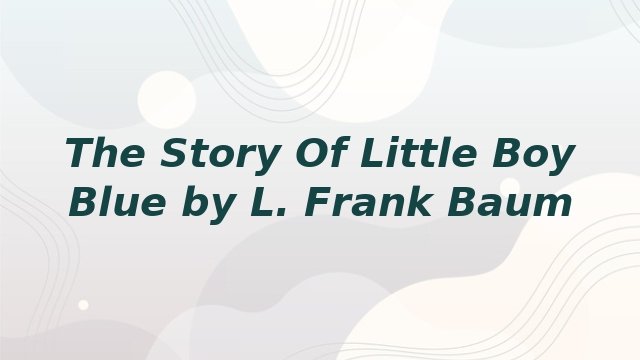
The Story Of Little Boy Blue by L. Frank Baum
Little Boy Blue, come blow your horn.
The sheep ‘s in the meadow, the cow ‘s in the corn;
Where ‘s the little boy that minds the sheep?
He ‘s under the haystack, fast asleep!
There once lived a poor widow who supported herself and her only son by gleaning in the fields the stalks of grain that had been missed by the reapers. Her little cottage was at the foot of a beautiful valley, upon the edge of the river that wound in and out among the green hills; and although poor, she was contented with her lot, for her home was pleasant and her lovely boy was a constant delight to her.
He had big blue eyes, and fair golden curls, and he loved his good mother very dearly, and was never more pleased than when she allowed him to help her with her work.
And so the years passed happily away till the boy was eight years old, but then the widow fell sick, and their little store of money melted gradually away.
“I do n’t know what we shall do for bread,” she said, kissing her boy with tears in her eyes, “for I am not yet strong enough to work, and we have no money left.”
“But I can work,” answered the boy; “and I ‘m sure if I go to the Squire up at the Hall he will give me something to do.”
At first the widow was reluctant to consent to this, since she loved to keep her child at her side, but finally, as nothing else could be done, she decided to let him go to see the Squire.
Being too proud to allow her son to go to the great house in his ragged clothes, she made him a new suit out of a pretty blue dress she had herself worn in happier times, and when it was finished and the boy dressed in it, he looked as pretty as a prince in a fairy tale. For the bright blue jacket set off his curls to good advantage, and the color just matched the blue of his eyes. His trousers were blue, also, and she took the silver buckles from her own shoes and put them on his, that he might appear the finer. And then she brushed his curls and placed his big straw hat upon them and sent him away with a kiss to see the Squire.
It so happened that the great man was walking in his garden with his daughter Madge that morning, and was feeling in an especially happy mood, so that when he suddenly looked up and saw a little boy before him, he said, kindly,
“Well, my child, what can I do for you?”
“If you please, sir,” said the boy, bravely, although he was frightened at meeting the Squire face to face, “I want you to give me some work to do, so that I can earn money.”
“Earn money!” repeated the Squire, “why do you wish to earn money?”
“To buy food for my mother, sir. We are very poor, and since she is no longer able to work for me I wish to work for her.”
“But what can you do?” asked the Squire; “you are too small to work in the fields.”
“I could earn something, sir, could n’t I?”
His tone was so pleading that mistress Madge was unable to resist it, and even the Squire was touched. The young lady came forward and took the boy’s hand in her own, and pressing back his curls, she kissed his fair cheek.
“You shall be our shepherd,” she said, pleasantly, “and keep the sheep out of the meadows and the cows from getting in to the corn. You know, father,” she continued, turning to the Squire, “it was only yesterday you said you must get a boy to tend the sheep, and this little boy can do it nicely.”
“Very well,” replied the Squire, “it shall be as you say, and if he is attentive and watchful he will be able to save me a good bit of trouble and so really earn his money.”
Then he turned to the child and said,
“Come to me in the morning, my little man, and I will give you a silver horn to blow, that you may call the sheep and the cows whenever they go astray. What is your name?”
“Oh, never mind his name, papa!” broke in the Squire’s daughter; “I shall call him Little Boy Blue, since he is dressed in blue from head to foot, and his dress but matches his eyes. And you must give him a good wage, also, for surely no Squire before ever had a prettier shepherd boy than this.”
“Very good,” said the Squire, cheerfully, as he pinched his daughter’s rosy cheek; “be watchful, Little Boy Blue, and you shall be well paid.”
Then Little Boy Blue thanked them both very sweetly and ran back over the hill and into the valley where his home lay nestled by the riverside, to tell the good news to his mother.
The poor widow wept tears of joy when she heard his story, and smiled when he told her that his name was to be Little Boy Blue. She knew the Squire was a kind master and would be good to her darling son.
Early the next morning Little Boy Blue was at the Hall, and the Squire’s steward gave him a new silver horn, that glistened brightly in the sunshine, and a golden cord to fasten it around his neck. And then he was given charge of the sheep and the cows, and told to keep them from straying into the meadowlands and the fields of grain.
It was not hard work, but just suited to Little Boy Blue’s age, and he was watchful and vigilant and made a very good shepherd boy indeed. His mother needed food no longer, for the Squire paid her son liberally, and the Squire’s daughter made a favorite of the small shepherd and loved to hear the call of his silver horn echoing amongst the hills. Even the sheep and the cows were fond of him, and always obeyed the sound of his horn; therefore the Squire’s corn thrived finely, and was never trampled.
Little Boy Blue was now very happy, and his mother was proud and contented and began to improve in health. After a few weeks she became strong enough to leave the cottage and walk a little in the fields each day; but she could not go far, because her limbs were too feeble to support her long, so the most she could attempt was to walk as far as the stile to meet Little Boy Blue as he came home from work in the evening. Then she would lean on his shoulder and return to the cottage with him, and the boy was very glad he could thus support his darling mother and assist her faltering steps.
But one day a great misfortune came upon them, since it is true that no life can be so happy but that sorrow will creep in to temper it.
Little Boy Blue came homeward one evening very light of heart and whistled merrily as he walked, for he thought he should find his mother awaiting him at the stile and a good supper spread upon the table in the little cottage. But when he came to the stile his mother was not in sight, and in answer to his call a low moan of pain reached his ears.
Little Boy Blue sprang over the stile and found lying upon the ground his dear mother, her face white and drawn with suffering, and tears of anguish running down her cheeks. For she had slipped upon the stile and fallen, and her leg was broken!
Little Boy Blue ran to the cottage for water and bathed the poor woman’s face, and raised her head that she might drink. There were no neighbors, for the cottage stood all alone by the river, so the child was obliged to support his mother in his arms as best he could while she crawled painfully back to the cottage. Fortunately, it was not far, and at last she was safely laid upon her bed. Then Little Boy Blue began to think what he should do next.
“Can I leave you alone while I go for the doctor, mamma?” he asked, anxiously, as he held her clasped hands tightly in his two little ones. His mother drew him towards her and kissed him.
“Take the boat, dear,” she said, “and fetch the doctor from the village. I shall be patient till you return.”
Little Boy Blue rushed away to the river bank and unfastened the little boat; and then he pulled sturdily down the river until he passed the bend and came to the pretty village below. When he had found the doctor and told of his mother’s misfortune, the good man promised to attend him at once, and very soon they were seated in the boat and on their way to the cottage.
It was very dark by this time, but Little Boy Blue knew every turn and bend in the river, and the doctor helped him pull at the oars, so that at last they came to the place where a faint light twinkled through the cottage window. They found the poor woman in much pain, but the doctor quickly set and bandaged her leg, and gave her some medicine to ease her suffering. It was nearly midnight when all was finished and the doctor was ready to start back to the village.
“Take good care of your mother,” he said to the boy, “and do n’t worry about her, for it is not a bad break and the leg will mend nicely in time; but she will be in bed many days, and you must nurse her as well as you are able.”
All through the night the boy sat by the bedside, bathing his mother’s fevered brow and ministering to her wants. And when the day broke she was resting easily and the pain had left her, and she told Little Boy Blue he must go to his work.
“For,” said she, “more than ever now we need the money you earn from the Squire, as my misfortune will add to the expenses of living, and we have the doctor to pay. Do not fear to leave me, for I shall rest quietly and sleep most of the time while you are away.”
Little Boy Blue did not like to leave his mother all alone, but he knew of no one he could ask to stay with her; so he placed food and water by her bedside, and ate a little breakfast himself, and started off to tend his sheep.
The sun was shining brightly, and the birds sang sweetly in the trees, and the crickets chirped just as merrily as if this great trouble had not come to Little Boy Blue to make him sad.
But he went bravely to his work, and for several hours he watched carefully; and the men at work in the fields, and the Squire’s daughter, who sat embroidering upon the porch of the great house, heard often the sound of his horn as he called the straying sheep to his side.
But he had not slept the whole night, and he was tired with his long watch at his mother’s bedside, and so in spite of himself the lashes would droop occasionally over his blue eyes, for he was only a child, and children feel the loss of sleep more than older people.
Still, Little Boy Blue had no intention of sleeping while he was on duty, and bravely fought against the drowsiness that was creeping over him. The sun shone very hot that day, and he walked to the shady side of a big haystack and sat down upon the ground, leaning his back against the stack.
The cows and sheep were quietly browsing near him, and he watched them earnestly for a time, listening to the singing of the birds, and the gentle tinkling of the bells upon the wethers, and the faraway songs of the reapers that the breeze brought to his ears.
And before he knew it the blue eyes had closed fast, and the golden head lay back upon the hay, and Little Boy Blue was fast asleep and dreaming that his mother was well again and had come to the stile to meet him.
The sheep strayed near the edge of the meadow and paused, waiting for the warning sound of the horn. And the breeze carried the fragrance of the growing corn to the nostrils of the browsing cows and tempted them nearer and nearer to the forbidden feast. But the silver horn was silent, and before long the cows were feeding upon the Squire’s pet cornfield and the sheep were enjoying themselves amidst the juicy grasses of the meadows.
The Squire himself was returning from a long, weary ride over his farms, and when he came to the cornfield and saw the cows trampling down the grain and feeding upon the golden stalks he was very angry.
“Little Boy Blue!” he cried; “ho! Little Boy Blue, come blow your horn!” But there was no reply. He rode on a way and now discovered that the sheep were deep within the meadows, and that made him more angry still.
“Here, Isaac,” he said to a farmer’s lad who chanced to pass by, “where is Little Boy Blue?”
“He ‘s under the haystack, your honor, fast asleep!” replied Isaac with a grin, for he had passed that way and seen that the boy was lying asleep.
“Will you go and wake him?” asked the Squire; “for he must drive out the sheep and the cows before they do more damage.”
“Not I,” replied Isaac, “if I wake him he ‘ll surely cry, for he is but a baby, and not fit to mind the sheep. But I myself will drive them out for your honor,” and away he ran to do so, thinking that now the Squire would give him Little Boy Blue’s place, and make him the shepherd boy, for Isaac had long coveted the position.
The Squire’s daughter, hearing the angry tones of her father’s voice, now came out to see what was amiss, and when she heard that Little Boy Blue had failed in his trust she was deeply grieved, for she had loved the child for his pretty ways.
The Squire dismounted from his horse and came to where the boy was lying.
“Awake!” said he, shaking him by the shoulder, “and depart from my lands, for you have betrayed my trust, and let the sheep and the cows stray into the fields and meadows!”
Little Boy Blue started up at once and rubbed his eyes; and then he did as Isaac prophesied, and began to weep bitterly, for his heart was sore that he had failed in his duty to the good Squire and so forfeited his confidence.
But the Squire’s daughter was moved by the child’s tears, so she took him upon her lap and comforted him, asking,
“Why did you sleep, Little Boy Blue, when you should have watched the cows and the sheep?”
“My mother has broken her leg,” answered the boy, between his sobs, “and I did not sleep all last night, but sat by her bedside nursing her. And I tried hard not to fall asleep, but could not help myself; and oh, Squire! I hope you will forgive me this once, for my poor mother’s sake!”
“Where does your mother live?” asked the Squire, in a kindly tone, for he had already forgiven Little Boy Blue.
“In the cottage down by the river,” answered the child; “and she is all alone, for there is no one near to help us in our trouble.”
“Come,” said Mistress Madge, rising to her feet and taking his hand; “lead us to your home, and we will see if we cannot assist your poor mother.”
So the Squire and his daughter and Little Boy Blue all walked down to the little cottage, and the Squire had a long talk with the poor widow. And that same day a big basket of dainties was sent to the cottage, and Mistress Madge bade her own maid go to the widow and nurse her carefully until she recovered.
So that after all Little Boy Blue did more for his dear mother by falling asleep than he could had he kept wide awake; for after his mother was well again the Squire gave them a pretty cottage to live in very near to the great house itself, and the Squire’s daughter was ever afterward their good friend, and saw that they wanted for no comforts of life.
And Little Boy Blue did not fall asleep again at his post, but watched the cows and the sheep faithfully for many years, until he grew up to manhood and had a farm of his own.
He always said his mother’s accident had brought him good luck, but I think it was rather his own loving heart and his devotion to his mother that made him friends. For no one is afraid to trust a boy who loves to serve and care for his mother.





